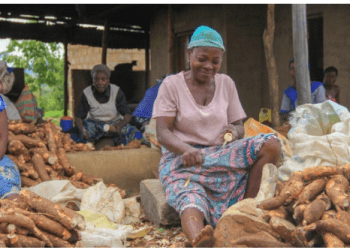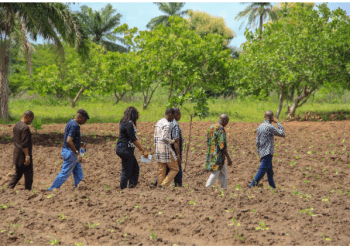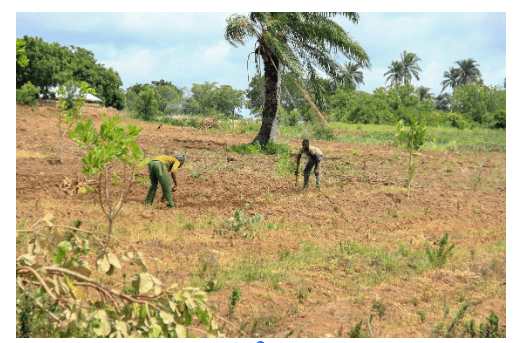Tobacco cultivation has been a long-held tradition among farmers of Oke-Ogun of Oyo State. They were so tied to it that they seemed to have little patience for food crops. In the days of old, the Nigeria Tobacco Company (NTC) was the major buyer of their leaves. All along, there have been concern over the health and profitability of the product among the farmers. They have always cultivated it and been at the mercy of companies who dictate how much they are going to pay for their products.
Many of the farmers therefore thinking of the gain felt it was better to farm tobacco leaves than food crops. This notion gained motion in the nineties with the dawn of democracy when the government of President Olusegun Obasanjo gave British American Tobacco (BAT) the blank cheque to build a gigantic factory in Ibadan. Many farmers who had hitherto abandoned tobacco farming in Oke-Ogun areas were lured back into the business by the BAT, which offered them “generous” terms, which in actual fact was like a poisoned chalice.
In May 2023, the Corporate Accountability and Public Participation Africa (CAPPA), decided to visit the Oke-Ogun area to see the farmers and see how they are doing. In 2011, the current CAPPA team then staffers of the Environmental Rights Action (ERA) had visited the area to see the farmers and how they were faring. However, the visit of May 2023 was a far cry from what the team saw in the previous visits. The claims by BAT that it has introduced the farmers to alternative farming was a ruse as most of them were still engaged in subsistence farming. They make very little from cultivating cassava and maize.
The 2023 theme for the World No Tobacco Day of May 31 is: “We need food, not tobacco”. The aim of which is to get tobacco farmers to transit from tobacco growing to sustainable and nutritious crops by providing awareness concerning marketing options and production alternatives. According to the World Health Organization (WHO), the day is set aside to promote awareness about the risks related to cultivating, curing and tobacco use and its effects on the family, society, the environment and as recent studies have shown, the climate.
The choice of the theme is to propel governments to incentivize farmers to explore alternatives to planting tobacco and ensure food security which is of immediate importance in the African continent. However, because of the deception of the past by the tobacco companies and the failure of governments to intervene to assist farmers’ transit, some farmers still think it is more profitable for them to cultivate tobacco than plant food crops. But most of the farmers have taken their destinies in their own hands. In the fields and farms from Iseyin to Ilua, and Ilero some of the farmers have turned a new leaf planting food crop, although some still hold the view that if the tobacco merchants approach them with juicy offers they will go back to tobacco farming. They insist that, the government has not done enough to promote food crop farming. They bemoan the lack of access to loan facilities and tractors to till their lands.

Helpless farmers
The farmers are appealing to the government at all levels to come to their rescue. Mr Fasasi Ramonu Olorunlugo, 63, said in the past when he used to farm tobacco leaves on his Ilua farm, the tobacco companies used to send their representatives to them to purchase their products and transport it to their Ibadan office. He believes that now that government policy and the reality of the times have led to the exit of the tobacco companies’ the government should step in and help the farmers. According to him, if there are provisions of subsidized tractors and fertilisers they would be willing to plant more food crops. As of now, he still plants some tobacco leaves which he said are sold to some private individuals who come around to buy the leaves at cheaper rates than what they are used to when BAT was around.
While agreeing that tobacco farming was more labour-intensive than crop farming, Olorunlugo said, “Tobacco cultivation is labour-intensive, so If you don’t have enough workers, you cannot cultivate tobacco because we have to weed it manually; we cannot use chemicals.” Asked if the curing (the process of preparing by drying) the leaves after harvesting does not affect their health as researchers have confirmed it does. He resorted to the belief in the myth that tobacco leaves contain some scents that drives away bad spirits from the community and as such it cannot harm anyone!
According to him “We are very experienced in this, and we take local herbs too, to help. We make intense fire to cure the tobacco leaves and the smell is very strong. Also, the Oyinbo people said tobacco kills by instalment. We also devised a means around it and we take local herbs.”
On the other hand, Gabriel Ojebisi, who is in his mid-fifties and has been going to the farm with his father since his teenage years, blamed the government for the focus of farmers on tobacco farming than crop farming. According to him, “The issue is not with helping the farmers, but the issue is that when help is being rendered it does not get to those farmers who actually need them but to people who are not farmers.” He said whatever plan the government has for the farmers, they should ensure that it gets to the real farmers and not some civil servants who usually sit over such benefits. He believes that the way the federal government assists farmers in the northern part of the country should also be extended to the southern part. He supports the shift of focus from tobacco farming to food crops because “Tobacco is not something that we can consume.”
In Ilero community, Alhaji Salami Fasasi, who said he has been a tobacco farmer for 50 years said, “I stopped planting when the government kept increasing tax of the companies we were cultivating for, and those companies relocated to Ghana.” He is referring to the best practice around the world which has led to the increase in tobacco taxes to cut its use due to established research, that has linking its consumption to cancer and other non-communicable diseases.
Pa Fasasi bemoaned that in the past there were more than 40 tobacco farmers in the sleepy Ilero community of Oke-Ogun, “but we don’t have anyone again since the government stopped us. Currently, I cultivate maize and cassava since we don’t have buyers for tobacco.”
Sabotage by the tobacco industry
What has become apparent from the responses of the farmers spoken to was that the tobacco companies have clearly made them to believe that the government had stopped them from doing a ‘lucrative’ business. They hid away from them research that have linked both the cultivation and consumption of products tobacco to rising cost of healthcare and such diseases as cancer of the lungs, larynx mouth, esophagus, throat, bladder, kidney, liver, stomach, pancreas, colon and cervix, as well as acute myeloid leukemia across the world. The theme of this year’s World No Tobacco Day, “We need food, not tobacco”, is therefore apt and should be emphasized because the cultivation of food saves humanity and the environment.
In addition, the theme focuses on exposing the efforts of the tobacco industry’s sabotage initiatives to replace tobacco with sustainable crops, leading to the global food crisis. Governments at all levels have to respond to the clarion call to make it easy for the farmers to access aids so as to make food security a guarantee.

Dr Oyegbile is a Lagos-based journalist and development worker

